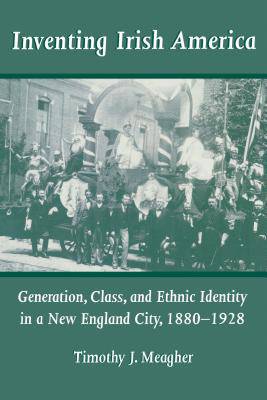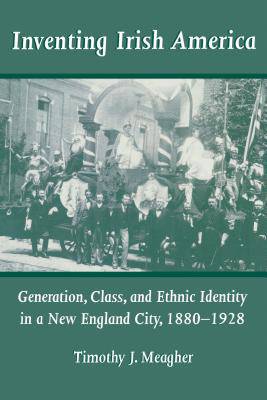
- Retrait gratuit dans votre magasin Club
- 7.000.000 titres dans notre catalogue
- Payer en toute sécurité
- Toujours un magasin près de chez vous
- Retrait gratuit dans votre magasin Club
- 7.000.0000 titres dans notre catalogue
- Payer en toute sécurité
- Toujours un magasin près de chez vous
Inventing Irish America
Generation, Class, and Ethnic Identity in a New England City, 18801928
Timothy J MeagherDescription
Like many American cities, Worcester, Massachusetts, is an enclave of cultural tradition and ethnic pride. Through the intensive analysis of this Irish American community at the turn of the twentieth century, Timothy Meagher reveals how an ethnic group can endure and yet change when its first American-born generation takes control of its destiny. Meagher traces the chaotic and complicated passage of Irish Americans from their status as isolated immigrants, through accommodation in the 1880s and ethnocentric belligerence in the 1890s, to leadership of a pan-ethnic American Catholic people in the early twentieth century. He shows how these shifts resulted from both the initiatives of a new generation and changing relations with Yankee and ethnic neighbors, examining along the way such topics as women's prominence in the local nationalist movement, marriage patterns among the second generation, and cross-party coalitions that Irish Democrats forged with Yankee Republicans. A fourth-generation Worcester native, Meagher examines nearly every aspect of Irish American life in his city to discover how his family and others like them attempted to resolve the dilemma of identity. He analyzes the changing definitions of identities and boundaries over a crucial forty-year period and shows how the rise of a new generation to community leadership brought about a quiet but powerful revolution in people's everyday lives. Inventing Irish America focuses on the cultural transition of Irish Americans from one generation to the next and offers readers new insight into the creation of their identity. By studying one community in generational transition, it sheds new light on all places where ethnic and racial groups struggle to maintain their identities by reinventing themselves through time.
Spécifications
Parties prenantes
- Auteur(s) :
- Editeur:
Contenu
- Nombre de pages :
- 546
- Langue:
- Anglais
- Collection :
- Tome:
- n° 4
Caractéristiques
- EAN:
- 9780268031541
- Date de parution :
- 02-04-01
- Format:
- Livre broché
- Format numérique:
- Trade paperback (VS)
- Dimensions :
- 150 mm x 226 mm
- Poids :
- 703 g

Les avis
Nous publions uniquement les avis qui respectent les conditions requises. Consultez nos conditions pour les avis.






